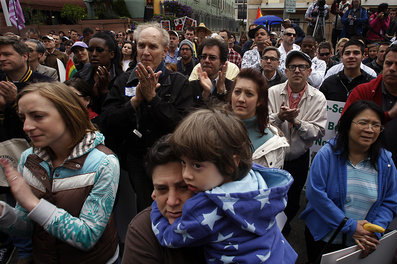SACRAMENTO, Calif. — California lawmakers narrowly advanced a bill last Tuesday that would repeal a state law designed to find the causes and cures of homosexuality.
The law, written in 1950, classifies homosexuals as “sexual deviants” and requires the state Department of Mental Health to conduct research on “deviations conducive to sex crimes against children.” The research would be used to help identify potential sex offenders.
The bill moved out of the Assembly Committee on Public Safety on a 4-0 vote, with one Democrat and two Republican members abstaining from voting. They said the law’s reference to homosexuality should be removed, but that the state should continue researching sex crimes.
California put the law on the books as a response to public outcry after a series of sex crimes in Los Angeles, which included the rape and murder of a 6-year-old girl. The murderer, who openly confessed his crime, was not gay.
“Even then, there was no legal justification to say that gay people needed to be understood and cured in the exact same way as sexual predators who rape and kill children,” said Assemblywoman Bonnie Lowenthal (D-Long Beach), who sponsored the bill.
“For us to leave it there would be wrong,” she said.
Lowenthal said California has not conducted research into homosexuality for decades, but did release several reports that examined hormone levels, physical characteristics and parental relationships of its subjects.
The American Psychiatric Association listed homosexuality as a mental disorder until 1973.
“This code simply mischaracterizes and institutes bigotry against the gay, lesbian, bisexual and transgender community,” said Mario Guerrero, a director of Equality California, a gay-rights group.
Guerrero stressed that his organization supports child safety and credible research, but not the research that was brought about by the law.
The legislators who withheld support last week said they preferred to strip the language about homosexual behavior from the law and leave in the provisions requiring the state to conduct research into the causes of sex crimes.
“This is probably one of my saddest moments as a legislator, because you know where my heart is on what you’re trying to do,” said Assemblyman Anthony Portantino (D-Pasadena), who abstained from voting. “It’s offensive that somebody 60 years ago would try to include that as a disorder when we know it’s not.”
Assemblymen Curt Hagman (R-Diamond Bar) and Danny Gilmore (R-Hanford) abstained from voting for similar reasons.
Lowenthal said that the research would be better left to universities than the state.
“At this time, we certainly don’t need to be spending the money,” she said.
Aside from the lawmakers who abstained, no one voiced opposition to the bill. But a group called Parents and Friends of ExGays and Gays, also known as PFOX, sent a letter to Lowenthal stating that research into the causes of homosexuality is a legitimate form of science that benefits both “ex-gay” and gay communities.
The national organization advocates for the ex-gay community, stating that no one is born homosexual. They distribute religious and scientific information on the topic.
“Being able to research the cure for those types of emotions is the way we have hope,” said Jeralee Smith, the PFOX California Educational Director, in a phone interview.
Smith, 61, believes research into the causes and cures of homosexuality should be continued, and called the move to end funding offensive.
Smith said she was molested by a woman when she was 16. She added that she spent most of her life in same-sex relationships, found it very painful and later reoriented her thought patterns to what she called healthier ways.
Smith said she doesn’t believe sex offenders are predominantly homosexuals, but that she doesn’t think they should be excluded from research on the topic.
“I just don’t think any door should be closed when we’re trying to stop attacks on children,” she said.

